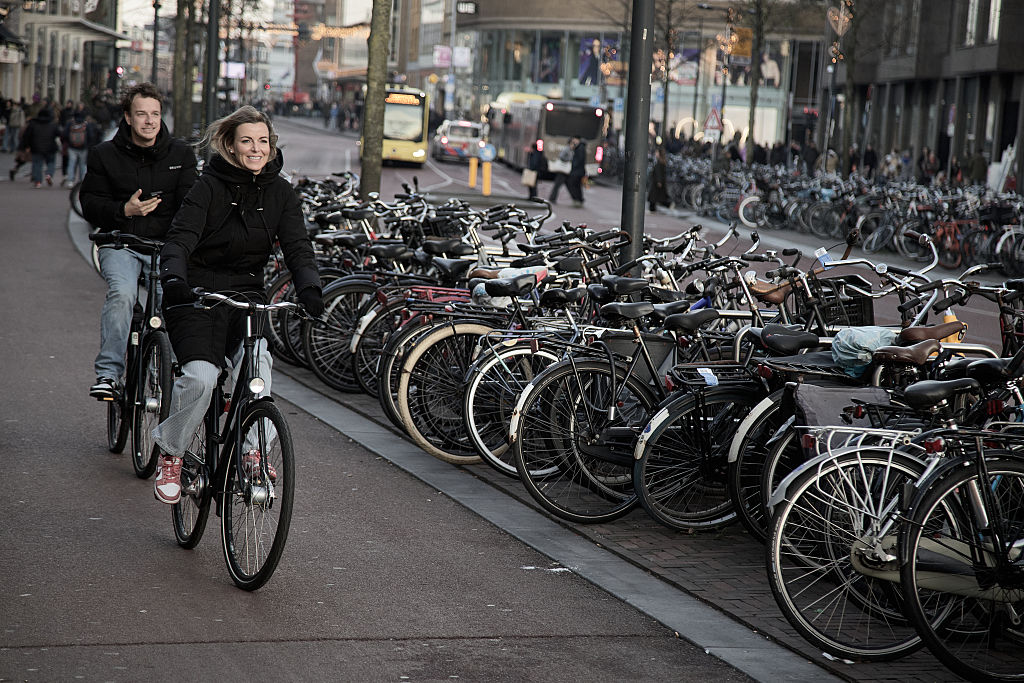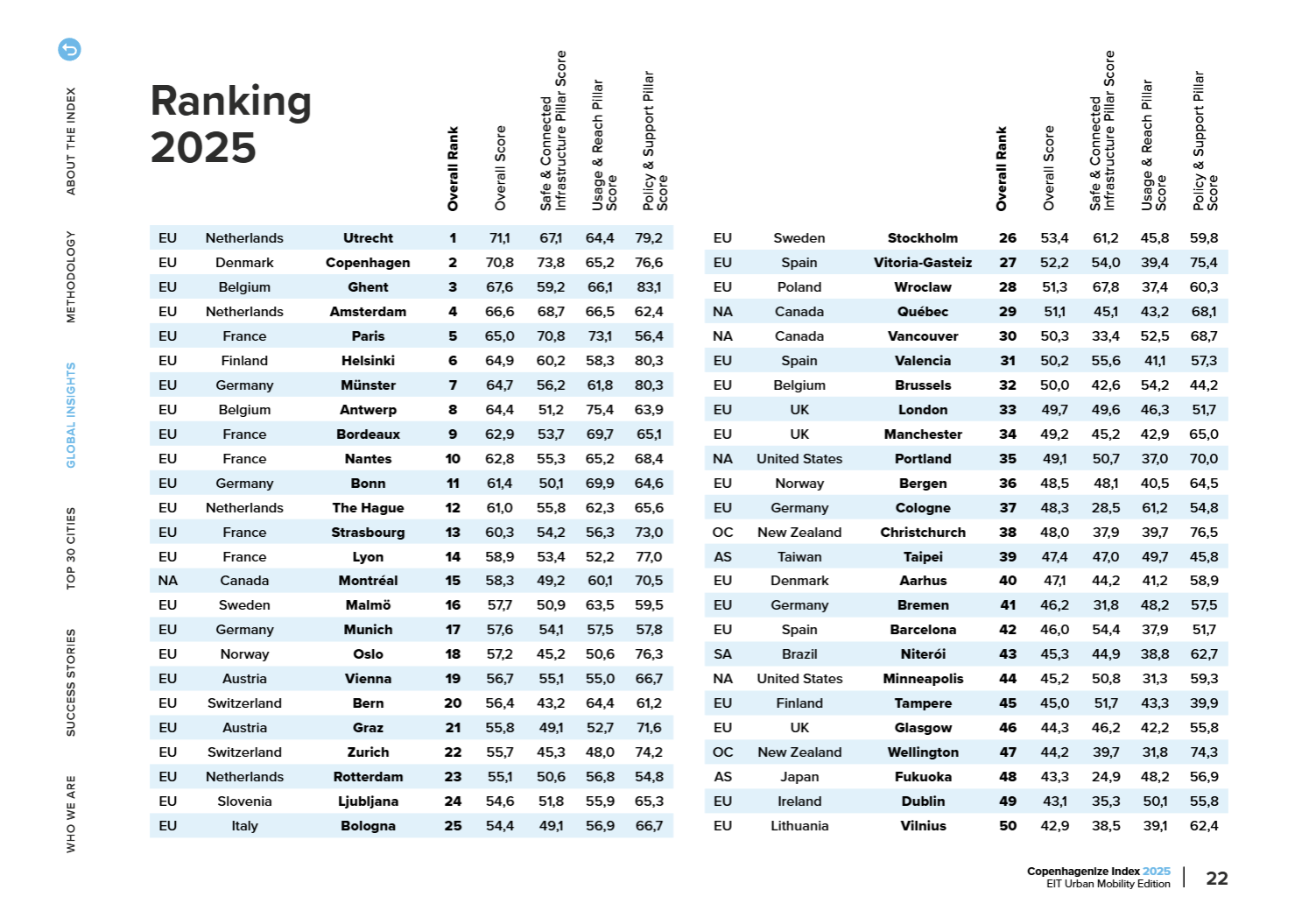'It's a snapshot of how cities are reclaiming public space' - none of the top 30 cycling cities in the world are in the UK or USA
We should all be more like Utrecht: "a city built on flow"


The latest race content, interviews, features, reviews and expert buying guides, direct to your inbox!
You are now subscribed
Your newsletter sign-up was successful
The list of the world’s top 30 bike-friendly cities has been released, and the UK and the USA are nowhere to be seen.
Scroll past the Dutch-dominated top-ten, from Utrecht to Amsterdam, past Sweden, Germany, Austria, France and, three places short of the golden 30 is London, followed immediately by Manchester. Liverpool didn’t get a look in. Portland is the highest ranking city in the USA, at 35th.
What makes a “bike-friendly” city? According to the consultancy Copenhagenize and their co-author, EIT Urban Mobility, there are three main pillars that a city has to hit (beyond having a population of over 250,000): that it offers safe and connected infrastructure (with bonus points awarded with each kilometre); that the use of bicycles is fair and sustained (including the city’s approach to cycle-share systems) and that political postulating around support for cycling is actualised by those in power.

There are subsets to these central pillars, including a specific focus on women’s uptake and participation in cycling. Within this subset, the role of 15-minute cities in creating a culture around cycling is highlighted. The idea behind the 15-minute city is to create neighbourhoods that are interconnected and community-centred.
But here in the UK, the term has largely fallen out of favour after rampant false claims that they were designed to create “open-air prisons” - Oxford dropped the use of the term altogether. However, in Paris, where the term was coined, organisers and town planners have been working with the city’s pro-cycling mayor, Anne Hidalgo, to implement over fifty 15-minute cities. This year Paris placed fifth in the index.
Utrecht, the Netherlands’ fourth-largest city, came first in the 2025 index. “A compact, human-size city,” nearly one-third of all trips there are made by bicycle, and the city is currently developing a fully car-free district that will house over 12,000 people. With an annual cycling budget of 63 euro per person, Utrecht’s efforts to change the culture of the city towards cycling is bolstered by real, financial investment. “The goal is no longer to make space for cycling, but to construct the city around cycling,” the report read.
Copenhagen and Amsterdam, Europe’s “original” cycling cities follow. The Danish capital continues to boast the highest infrastructure density in the world, with 52 kilometres of protected cycle paths for every 100 km of roadway. Over past five years, it has invested nearly 38 euro per inhabitant annually in cycling, making it one of the most consistent cities when it comes to investment in cycling - its challenge now is to keep it up, as the number of cars on its roads continues to increase.
The latest race content, interviews, features, reviews and expert buying guides, direct to your inbox!
But the report stretches wider than Europe. In Nairobi, a monthly ride-out encourages people to get out and cycle with each other, and to "install a cycling culture in Kenya’s capital.” Already other cycling groups have sprung from this stalwart event, including a women’s group, and one to encourage cycling within families. In the United States, where investment in cycling is suffering nation-wide, Minneapolis is quickly becoming one of the country’s leading cycling cities, reconstructing car-centric residential streets into bike paths.
“Ultimately, the 2025 edition of the Copenhagenize Index is more than a ranking,” the report concludes, “It is a snapshot of how cities are redefining mobility and reclaiming public space. It shows that investing in cycling is not just about transportation, but about shaping healthier, more resilient, and more equitable cities.”
So, where is the UK? In 2011, London ranked 16th in the index. This year, it has fallen behind by more than twice that, as other countries continue to tap into the social, environmental and health benefits of a city built around sustainable travel.
Relative to the rest of the UK, London's cycling budget per-person is more than twice that of other cities, at approximately £22.50 per year. With continued investment in dedicated bike lanes, and a sustained commitment towards building neighbourhoods that keep active travel options at its heart, London - and Manchester, and Liverpool, and any number of UK cities - could climb back into the top thirty - we've got two more years until the next index. Game on.

The fact that the UK didn't make it into the top 30 is disappointing, but unfortunately not surprising. A bike is a radical tool. It's something many of us grow up taking for granted (though access to a bike is a privilege in itself). Free travel is revolutionary, and supporting cycling is a way to centre people - ensuring our safety, and our autonomy as we navigate through our cities. This index, with its clearly outlined forward steps, should light a fire under us. Utrecht has done it - so can we.

Meg is a news writer for Cycling Weekly. In her time around cycling, Meg is a podcast producer and lover of anything that gets her outside, and moving.
From the Welsh-English borderlands, Meg's first taste of cycling was downhill - she's now learning to love the up, and swapping her full-sus for gravel (for the most part!).
You must confirm your public display name before commenting
Please logout and then login again, you will then be prompted to enter your display name.